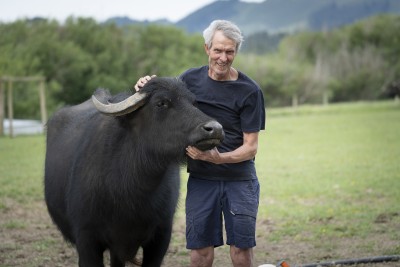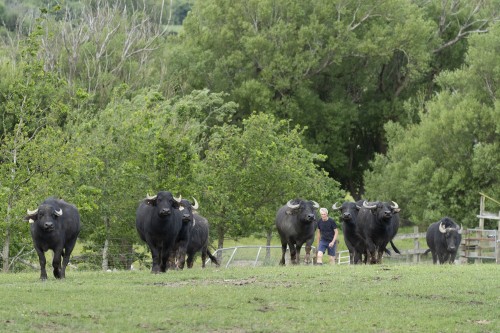Christo the Buffalo Herder


Christo Keijzer and Lucy Appleton are committed to sustainable farming. They decided to raise buffalo in 2008 when they were looking at what they could do on their lifestyle block in the Wairiri Valley, in Glenroy.

Christo and his water buffalo
The Selwyn region attracted them because of its fertile soil and larger property sizes. “We wanted to live in the country. We wanted to do something sustainable with the land we had, something environmentally friendly. Dairy is not our game,” Christo said.
The pair purchased buffalo from the North Island and bred them with animals from Melbourne until they had the Italian-type animals they wanted. The Riverine variety, that have lived in Italy for more than 800 years, are the dairy cousins to the swamp dwelling buffalo. The milk from these animals is high in milksolids and is ideal for cheese-making.
Wairiri Water Buffalo produce yoghurt and cheeses, including halloumi, mozzarella and ricotta. Christo said they wanted to make cheese because they liked the qualities of buffalo milk products. “The milk has lower cholesterol [than dairy]. People who have a dairy intolerance can still eat buffalo products.”
Lucy travelled to Italy to learn the precise techniques for making authentic mozzarella and other cheeses. Wairiri Buffalo cheese won the silver award in the 2019 Eurofins NZ Champion European Style Cheese category for its halloumi. But Christo is humble about the business. “I am still working in my day job at the airport. But this is quite a full-time job.”

Herding the buffalo to the milking shed
Organic and environmental practises are important at Wairiri. The 40ha farm encompasses the Wairiri Stream and 16ha native bush and wetlands which are fenced and planted to filter runoff from the grazing areas. The buffalo are able to graze freely with a herd size that will not exceed what the land can support. The calves live close to the mothers and each animal is known by name.
The farm is totally organic and opts for high quality living rather than being driven by quantity of product. “We wanted to do something sustainable, to set a worldwide example in a small way,” Christo said.